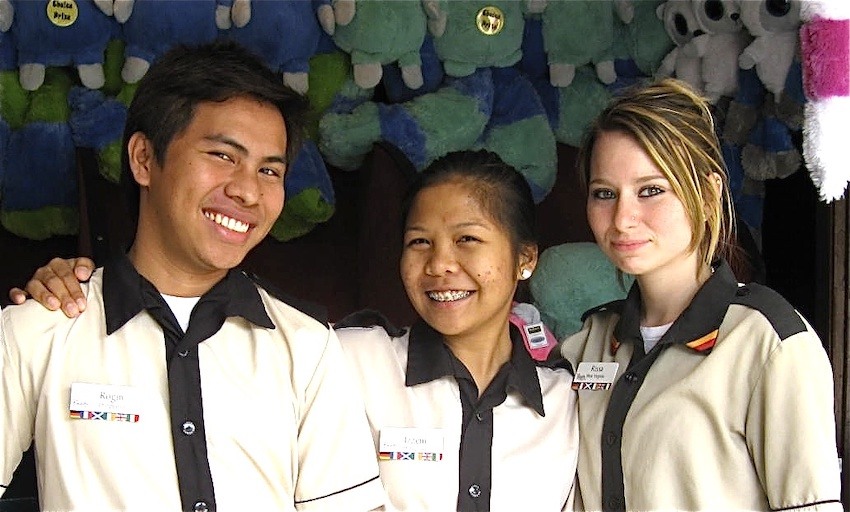Summer Work and Travel Research with GeoVisions
ENGLISH LANGUAGE SKILLS IMPROVE FOR STUDENTS ON A SHORT-TERM EXCHANGE PROGRAM
A Research Project Measuring Growth in English Language Skills for Foreign Students on the Summer Work and Travel J-1 Visa Program
December 2018
Academic Language Solutions worked closely with GeoVisions, a respected J-1 Exchange Visitor sponsor, who bring foreign students to the United States to work during their school summer vacation on what is known as the Summer Work and Travel Program. In this case, the students were from the Southern Hemisphere, meaning their "summer vacation" was during the US winter season. The students come to the US on a J-1 Exchange Visitor Visa, and during this season, they generally work at ski resorts, hotels, restaurants, and theme parks that cannot recruit enough American workers for these seasonal jobs.
The purpose of this research was to measure the improvement in English language skills, which is one of the goals of the Department of State exchange program. Did foreign students who came to the US for just 3-4 months really improve their language skills, and how did this vary depending on the types of jobs to which students were assigned.

Introduction
Every year, about 100,000 college and university students worldwide come to the United States on a cultural exchange program that allows them to work in seasonal and temporary jobs. Considered to be one of the State Department’s most successful examples of public diplomacy efforts, the Summer (referring to “summer” in the home country of exchange visitors) Work and Travel Program brings future leaders from dozens of countries to the US. It sets specific goals for participants, their host employers, and the organizations that recruit and sponsor them on the J-1 Cultural Exchange visa.
In a 2013 Guidance Directive, the Education and Cultural Affairs division of the State Department described the program, “The Summer Work Travel program provides foreign college and university students with opportunities to interact with U.S. citizens, practice the English language, experience U.S. culture while sharing their own cultures with Americans they meet, travel in the United States, and work in seasonal or temporary jobs that require minimal training to earn funds to help defray their expenses.”
The success of the cultural and diplomatic goals of the program have been documented in various reports and research projects, most recently in an analysis sponsored by the Alliance for International Exchange, “Review of Summer Work Travel Program: Program effects and economic impact.” Among the findings:
- 91% of participants cite cultural exchange as the main reason for participating in the program;
- 86% of participants viewed the program as a positive experience;
- 76% of the exchange visitors reported a positive change in their views of the United States, and,
- 94% of the young students made friends with Americans, and 88% said they would keep in touch with their new friends after they returned to their home country.
The interaction with US citizens, the experience of US culture, and the goals of traveling in the United States are met. But what about the chance to “practice the English language”? The program regulations require that exchange visitors, when working, work alongside Americans and in jobs that give them opportunities to speak and improve their English.
The Project and the iTEP Exam
New Hampshire-based GeoVisions, one of more than 40 State Department designated sponsors of the Work and Travel Program, teamed up with iTEP, International Test of English Proficiency, to do a two-stage testing pilot project (could be expanded to a larger universe of exchange visitors) to determine the impact of participating in the Work and Travel Program on English conversation skills. iTEP is a globally recognized exam that measures conversation skills in a stand-alone test or as an element of tests that measure grammar, reading, writing, listening, and speaking. The iTEP Conversation exam is a thirty-minute internet-based, on-demand test with modules that measure vocabulary, verbal fluency, decision-making, reading aloud, and other skill sets essential to conversational ability.
Some typical tasks involved in the iTEP exam include introducing him/herself and talking about friends and family, answering questions about a photo appearing on their computer screen, offering a personal opinion about a topic, and answering short questions about an informal, everyday situation.
Test-takers’ responses are captured on audio files online and graded by trained English as a Second Language certified teachers who follow a standardized rubric to ensure fairness and consistency of grading.
One hundred university-aged students from five South American countries took part in the first round of tests before participating in the winter intake of the Work and Travel Program. These students were bound for ski and warm weather resorts throughout the United States. They would be hosted in an exchange program and work in a variety of seasonal and temporary jobs alongside American workers, interacting to various degrees with English-speaking visitors. After the work portion of their program, the students had an opportunity to travel throughout the United States before returning to classes at their home country institutions.
After the students returned home, they were invited to take the iTEP exam a second time to determine whether they had progressed in their English conversational skills. 20% of the students opted to participate in the second round of exams, and these 20 students were representative of the original group of students who took the exam, and the original group was chosen at random from students participating in the broader work and travel program.
Of the 20 students, two experienced technical difficulties in recording their answers, so the following observations represent a group of eighteen non-English speakers who came to the United States to discover American culture, meet new friends, and improve their English language skills.
Conclusions
It can be definitely concluded that the students who took both the first and second round of exams improved their English conversation skills, some very significantly. The iTEP exam is scored on a 100-point scale, and only one of the eighteen students did not maintain or improve on their score. Improved scores range from one point to 17 points, with a median gain of 11 points on a median initial score after the first round of exams of 82.5 points, for an average increase of 13% on the conversation scale.
85% of Students scored the Same or Higher on the Second Test

The iTEP exam gives participants an overall score in assessing their skills and measures eleven skills essential to conversational competence. The results show that students improved the most in skills requiring analysis and thought processes. The more technical skills like reading aloud and verbal fluency, skills that would likely improve in more of a classroom setting, did not improve as much as the skills like decision-making, conversational content, and the ability to craft free responses. Frequent interaction with English speakers and the necessity of developing more advanced conversational skills contribute to both skills development and increased confidence to take risks in the course of a conversation.
Relative Improvement Factor by Skill

Of the test-takers who took both rounds of exams, their original scores ranged from 69 to 100 points. Was there a group of students who progressed the most? Those that scored in the 90’s did not have as much room to grow as those in the 60’s and 70’s. There was the most substantial improvement at the lower end of the scoring spectrum. It was at the higher end of the range where there was little movement, and the significance of a move up or down of a couple of points is not all that meaningful.
Improvement by Original Score Range

Participants in the study held a variety of jobs, and each of those jobs required a different level of conversation skills. The skills needed by the housekeeper or the prep cook are not the same as the ski lift operator or the cashier. We categorized each job type as to whether it required a high level of English, a medium level, or a low level. Interestingly, the positions that required a lower level of English and assumed a lower frequency of customer contact yielded similar point gains for participants as those needing higher levels of English were presumably more “front-line.” The Work and Travel Program offers a compelling experience for improving conversational skills, regardless of the required level of English and the frequency of contact with English speakers.
Improvement by English Level required by Job

We placed each of the jobs into one of five categories and examined the median point improvement in English skills in each category. The research does not uphold the conventional wisdom that a housekeeper would not have as much customer contact as, say, a ski lift operator, and thus, not have as many chances to practice English and, therefore, be less likely to improve English conversation. Other factors may influence the improvement of conversational skills, such as the personality and drive of the participant, which may be a topic for another study at another time.
English Improvement By Position

Students by gender were relatively evenly spread across job types, so gender was likely not a factor in English Improvement by Position. It is interesting to note, though, that, in this study, female participants significantly improved their scores compared to male students.
Female Students Improved English, Twice as Much as Males

Summary
This study, though a pilot research project conducted on a small scale, confirms that Summer Work and Travel as a program is an effective way for visiting students to improve their English conversation skills. The preliminary research upholds the claims of sponsors and their overseas partners who promise gains in language expertise through participation on the program. It further demonstrates that a student's position at a host employer is not a significant factor in how much language improvement can be attained.
Importantly, the improvement in iTEP English language test scores validates the Department of State goal that exchange programs have sufficient opportunities for exchange visitors to practice speaking English. Our research on the Summer Work and Travel program shows that such practice leads to an increase in English conversational skills. The iTEP Conversation exam is a unique measure of these successes.
GeoVisions is a Summer Work and Travel Program sponsor designated by the US Department of State. GeoVisions, 16 Market Square, Portsmouth, New Hampshire 03801, www.geovisions.com
iTEP (International Test of English Proficiency) is the developer of the iTEP Conversation Exam. iTEP, 22048 Sherman Way, Suite 210, Canoga Park, California 91308, www.iTEPexam.com
ACADEMIC Language Solutions is the authorized distributor of iTEP suite of English Language tests. Academic Language Solutions, 63 Whitfield Street, Guilford, CT 06437, www.academiclanguagesolutions.com
Download This Case Study Today.
We only need your contact details to keep track of the downloads.



